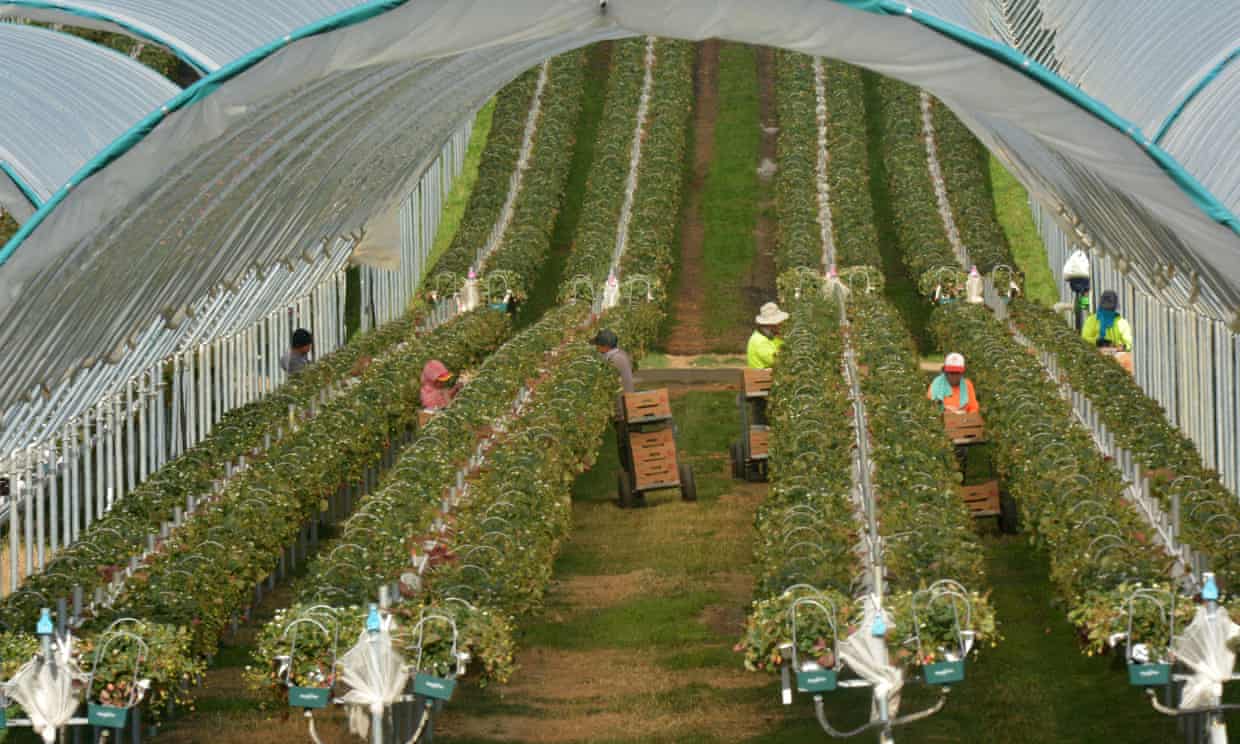
Australia news
Australia could include Pacific labourers in 'travel bubble' as $280m aid shake-up revealed
Money set aside for scholarship and volunteer projects will be redirected towards medical and humanitarian interventions in the region
by Ben DohertyAustralia is considering allowing Pacific labourers to travel to Australia to work where possible as part of a new foreign aid “policy pivot” that includes the redirection of $280m from Australia’s existing aid budget.
The pivot, Partnerships for Recovery, detailing Australia’s regional and development response to the Covid-19 pandemic, has been released by the foreign minister, Marise Payne, and the minister for international development and the Pacific, Alex Hawke.
The $280m diverted from Australia’s existing aid budget – mainly from scholarship and volunteer programs that have been deferred for the duration of pandemic lockdowns – has now been put towards critical medical and humanitarian interventions in the region.
The new policy paper prioritises assistance for near neighbours in the Pacific, Timor-Leste and Indonesia as the places where Australia has the most extensive existing partnerships and can have the greatest impact.
“Economies, jobs, education and health systems are being disrupted,” the paper says. “People are losing their livelihoods and being pushed into poverty. Frontline health workers ... are getting sick and dying before their time. The elderly, poor and other vulnerable groups are disproportionately affected.”
“How our neighbourhood emerges from this crisis will determine Australia’s economic and strategic circumstances for decades to come.”
Australia and New Zealand have already flagged a Trans-Tasman ‘bubble’ opening up their borders to each other only. An expert panel working on the proposal says it will be ready to present to both governments by early June and could be in operation by September.
Fiji and Vanuatu, two countries in the Pacific hugely dependent on tourism, have already expressed an interest in being allowed into a larger Trans-Pacific bubble.
The Pacific, as a region, has had very low numbers of Covid-19 infections, leveraging the region’s geographic isolation through the strict enforcement of border closures.
But there are significant fears if the virus were to gain a significant foothold in the region – it could devastate island communities, which have limited public health infrastructure, and populations with high rates of comorbidities.
Australia is seeking to help build island nations’ capacity to contact trace and to implement quarantine procedures.
“As economies open and movement becomes easier, we will continue to foster closer economic integration with Australia,” Dfat’s policy paper argues. “This will be a critical factor in the economic recovery and longer-term resilience of the Pacific and Timor-Leste.
“We will explore options to allow more Pacific workers to travel to Australia and to open further transport and tourism corridors to the region, while ensuring that appropriate safeguards remain in place.”
New Zealand will be the first country inside Australia’s bubble, and any later Pacific expansion will be dictated by the pandemic’s spread throughout the region and the public health capacity of Pacific nations. There is ongoing concern, too, about Indonesia’s porous border with PNG.
Australia has issued 2,000 visas to allow workers in Australia under the Pacific Labour Scheme and Seasonal Worker Program to remain in the country for up to 12 months.
It is also considering allowing one-way travel from some Pacific islands to Australia, for workers where there is a clear demand for their labour. Remittances are a powerful economic development tool for families and communities across the Pacific, and there is an emphasis across the region on re-starting economies while keeping the pandemic suppressed.
Australia’s agriculture and horticulture sectors are deeply reliant on foreign workers, and there are concerns from farm groups that an extended international travel ban could leave them short of labour.
The foreign minister, Marise Payne, said Australia’s Covid-19 response plan was “an unprecedented pivot of our development program”.
“In partnership with our neighbours, we are responding directly to their essential needs during this pandemic.”
The Dfat policy paper concedes “the scale of the Covid-19 crisis will dwarf the resources we have available, including through our official development assistance budget. Indeed, it will defy all conventional approaches to development.”
Australia’s overseas aid budget for 2019-20 is $4bn – 0.21% of gross national income, the lowest level in Australia’s history, and far below the 0.7% threshold agreed to at the UN general assembly in 1970, but which Australia has never reached. $1.4b of that figure is dedicated to the Pacific.
The chief executive of the Australian Council for International Development, Marc Purcell, said the council welcomed the government’s strategic clarity in responding to Covid-19’s “once-in-a-century threat” to health and livelihoods.
“Domestically, the government has rightfully pulled out all the stops in responding to Covid-19. Our response into the region needs to be the same.
“As the government concedes, the scale of the Covid-19 crisis will dwarf the resources we have available. To date, the government has only drawn on the existing development cooperation budget and has repurposed existing programs in its response.”
Purcell said the government should commit an additional one-off $2b injection of humanitarian funding next budget, similar to the $1b package John Howard’s government dedicated to Indonesia after the Boxing Day tsunami.
Purcell said Covid-19 needed to be ended everywhere and for everyone.
“We do not want the virus to circle back around. From Pacific communities who want to see the return of holidaymakers to Australian food manufacturers suffering from supply-chain breakdowns, resumption of ties is essential.”